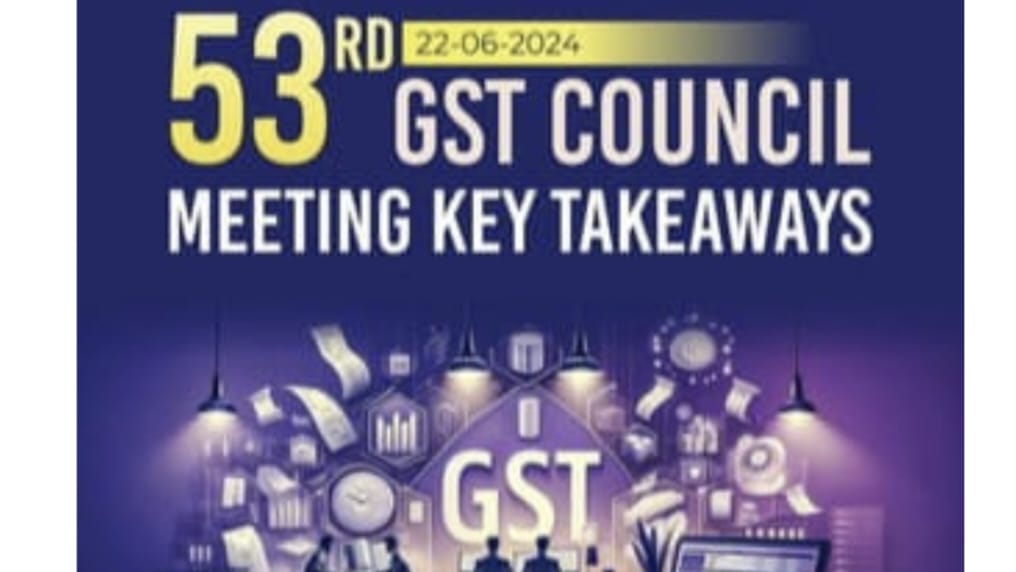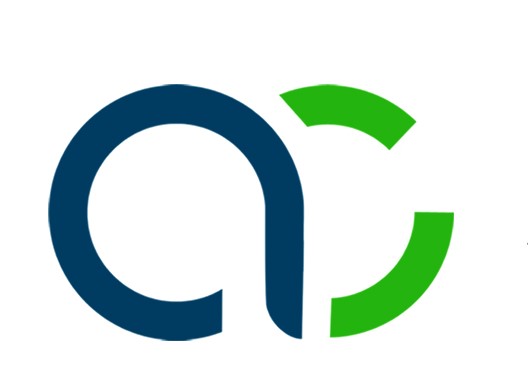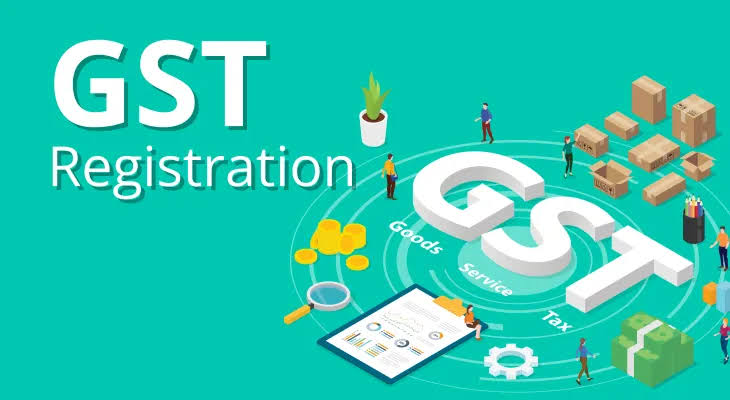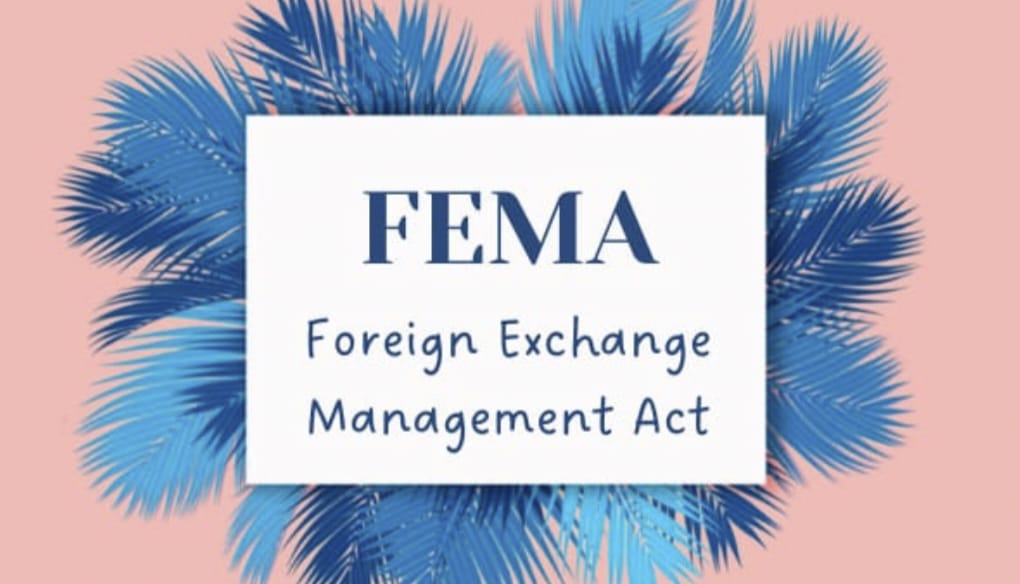Key Decisions from the 53rd GST Council Meeting
The 53rd GST Council meeting brought forward several significant updates aimed at simplifying compliance, providing relief to taxpayers, and refining the overall GST framework. Here's a detailed overview of the major decisions and their anticipated impacts.
Sector-Specific Updates, Enhancements in GST Filing and TCS Mechanisms, GST Compliance Reliefs and Strengthening GST Compliance and Simplification
1. Sector-Specific
Updates
·       Â
Major GST Exemptions for Indian
Railways Services :
              One of the meeting's highlights is the proposed GST exemptions for various Indian Railways services. This includes the sale of platform tickets, the use of retiring rooms, waiting rooms, cloakroom services, and battery-operated car services. Furthermore, intra-railway transactions will be exempted from GST. Effective from October 20, 2023, this move aims to reduce financial burdens on the public and streamline railway operations.
·       Â
Reforms in the Insurance Sector :
              The Council recommended classifying co-insurance premiums and re-insurance commissions as "no supply" under Schedule III of the CGST Act, 2017, simplifying tax for insurers. This means these transactions will not be considered taxable supplies, simplifying the tax landscape for insurers and reinsurers. This reform will be applied to past cases on an ‘as is where is’ basis.
·       Â
Refund Mechanism for Additional IGST
on Export Price Revisions :
              A new mechanism for claiming refunds on additional Integrated GST (IGST) paid due to upward revisions in the price of exported goods was recommended. This measure will aid exporters in reclaiming additional IGST paid when export prices are adjusted, thus simplifying the refund process and supporting the competitiveness of Indian exports on the global stage.
·       Â
Section 11A: Addressing GST Non-Levy
Due to Established Trade Practices :
             The Council proposed adding a new Section 11A to the CGST Act, empowering the government to regularize situations where GST has not been levied or has been under-levied due to prevalent trade practices. This adjustment ensures that businesses are not penalized for following standard industry practices.
2. Enhancements in GST
Filing and TCS Mechanisms
·       Â
Reduced TCS Rate for Electronic
Commerce Operators :
             To ease the financial load on suppliers using electronic commerce platforms, the GST Council recommended reducing the Tax Collected at Source (TCS) rate for Electronic Commerce Operators (ECOs) from 1% to 0.5%. This reduction aims to create a more favourable business environment for e-commerce and encourage sector growth.
·       Â
New Optional Facility for GSTR-1
Amendments :
              A new optional facility via FORM GSTR-1A will be introduced, allowing taxpayers to amend or add details in FORM GSTR-1 before filing returns in FORM GSTR-3B. This measure aims to streamline the filing process, reduce errors, and ensure accurate reflection of taxpayers' liabilities.
3. GST Compliance
Reliefs
·       Â
Extended Deadlines and Amendments in
Interest Calculation :
             The deadline for filing returns in FORM GSTR-4 for composition taxpayers has been extended from April 30 to June 30 for the financial year 2024-25 onwards. Additionally, an amendment to Rule 88B of the CGST Rules, 2017, was recommended to exclude amounts available in the Electronic Cash Ledger on the due date from the interest calculation for delayed return filings, ensuring fair interest charges.
·       Â
Section 128A: Conditional Waiver of
Interest and Penalty :
             The Council proposed adding Section 128A to the CGST Act to waive interest and penalties for demand notices issued under Section 73 for FY 2017-18, 2018-19, and 2019-20. Taxpayers must pay the full tax by March 31, 2025, to avail of this benefit, though it does not apply to erroneous refunds.
              Â
4. Strengthening GST
Compliance and Simplification
·       Â
Nationwide Roll-Out of
Biometric-Based Aadhaar Authentication :
            To enhance the integrity of the GST registration process, the Council proposed the nationwide roll-out of biometric-based Aadhaar authentication for registration applicants. This phased implementation will enhance registration and prevent fraudulent tax credit claims.
·       Â
Extensive Reporting and Exemptions
for Small Taxpayers :
              The threshold for reporting Business-to-Consumer (B2C) inter-State supplies invoice-wise in FORM GSTR-1 will be lowered from Rs. 2.5 lakh to Rs. 1 lakh. Additionally, taxpayers with an aggregate annual turnover of up to Rs. 2 crore will be exempted from filing annual returns in FORM GSTR-9/9A for FY 2023-24.
·       Â
Mandatory Monthly Filing for FORM
GSTR-7 and Waivers for Late Fees :
            The Council proposed that returns in FORM GSTR-7 should be submitted monthly, regardless of whether any tax has been deducted. No late fee for delayed Nil FORM GSTR-7 filings... Invoice-wise details may also be required in the return, promoting better compliance and accurate record-keeping.
Streamlining GST Legal Framework and Changes in GST Rates
5. Streamlining GST
Legal Framework
·
Monetary Limits for GST Appeals :
Monetary thresholds for filing appeals in GST cases have been proposed to minimize government litigation. The recommended limits are:
|
GST Appellate Tribunal (GSTAT): |
Rs. 20 Lakhs |
|
High Court : |
Rs. 1 Crore |
|
Supreme Court : |
Rs. 2 Crores |
These thresholds aim to streamline legal processes and reduce the burden of unnecessary litigation.
·
Sunset Clause for Anti-Profiteering
and GSTAT Handling :
Amendments to Sections 171 and 109 of the CGST Act, 2017, will introduce a sunset clause for anti-profiteering provisions and transfer the responsibility for handling anti-profiteering cases to the Principal Bench of the GST Appellate Tribunal (GSTAT). A deadline of April 1, 2025, has been set for the submission of new anti-profiteering applications.
6. Changes in GST Rates
The Council recommended changes to the GST rates applicable to various categories of goods:
|
Particulars |
Rate Applicable |
|
Parts, components, testing equipment, tools, and tool-kits of aircrafts, irrespective of their HS classification, are used to boost the MRO activities subject to specified conditions. |
5% IGST |
|
All milk cans (of steel, iron, and aluminium) |
12% |
|
Carton, boxes, and cases of both corrugated and non-corrugated paper or paperboard |
12% |
|
All solar cookers whether single or dual energy source |
12% |
|
All types of sprinklers including fire water sprinklers |
12% |
|
Parts of Poultry keeping Machinery |
12% |
|
Service by way of hostel accommodation is currently not exempted if outside educational institution upon satisfying the conditions that the rent limit is up to Rs. 20,000 per person per month, and the service is rendered for a continuous period of 90 days |
Exempt |
|
Corporate guarantee if in case it is for services or goods where whole ITC is available |
Exempt |
|
Services provided by Special Purpose Vehicles (SPV) to Indian Railway by way of allowing Indian Railway to use infrastructure built & owned by SPV during the concession period and maintenance services supplied by Indian Railways to SPV |
Exempt |
|
Imports of specified items for defence forces |
IGST is exempt for five years till 30th June 2029 |
|
Particulars |
Rate Applicable |
|
Extra Neutral Alcohol used for the manufacture of alcoholic liquor for human consumption |
Exempt |
|
Imports of research equipment/buoys imported under the Research Moored Array for African-Asian-Australian Monsoon Analysis and Prediction (RAMA) programme subject to specified conditions |
IGST is exempt |
|
Imports in SEZ-by-SEZ Unit/developers for authorised operations with effect from 1st July 2017 |
Compensation Cess is exempt |
|
Supply of aerated beverages and energy drinks to authorised customers by Unit Run Canteens under the Ministry of Defence |
Compensation Cess is exempt |
|
Import of technical documentation for AK-203 rifle kits imported for the Indian Defence forces |
Ad hoc IGST exemption provided |
These decisions reflect the Council's commitment to making the GST system more efficient, taxpayer-friendly, and aligned with the current economic landscape. The proposed changes aim to streamline compliance processes, provide necessary reliefs, and support various sectors in their growth and development.






